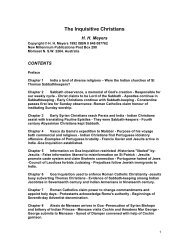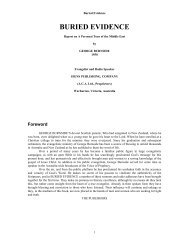Battle of the Bibles - Present Truth
Battle of the Bibles - Present Truth
Battle of the Bibles - Present Truth
Create successful ePaper yourself
Turn your PDF publications into a flip-book with our unique Google optimized e-Paper software.
"Having continued his labours in Scotland thirty-four years, he [Columba] clearly<br />
and openly foretold his death, and on Saturday, <strong>the</strong> ninth <strong>of</strong> June, said to his disciple<br />
Diermit: "This day is called <strong>the</strong> Sabbath, that is, <strong>the</strong> day <strong>of</strong> rest, and such will it truly be to<br />
me; for it will put an end to my labours" (Butler, "Lives <strong>of</strong> <strong>the</strong> Saints", Vol. 6 p 139).<br />
The Historian Andrew Lang confirms <strong>the</strong> practice <strong>of</strong> Sabbathkeeping among <strong>the</strong><br />
Celtic Churches:<br />
"They worked on Sunday, but kept Saturday in a sabbatical manner" (Lang, "A<br />
History <strong>of</strong> Scotland", Vol. 1 p 96).'<br />
Thinking readers may be perplexed at <strong>the</strong> thought <strong>of</strong> two <strong>of</strong> Rome's proclaimed<br />
saints observing <strong>the</strong> Biblical seventh-day Sabbath [Saturday]. But <strong>the</strong> sobering facts are<br />
that nei<strong>the</strong>r Patrick, Columba or <strong>the</strong> Celtic Churches in general, had any connection with<br />
<strong>the</strong> Bishop <strong>of</strong> Rome. Wm. Ca<strong>the</strong>art DD says: There is strong evidence that Patrick had<br />
no Roman commission in Ireland. As Patrick's churches in Ireland, like <strong>the</strong>ir brethren in<br />
Britain repudiated <strong>the</strong> supremacy <strong>of</strong> <strong>the</strong> popes, all knowledge <strong>of</strong> conversion <strong>of</strong> Ireland<br />
through his ministry must be suppressed [by Rome at all costs]" ("The Ancient British<br />
and Irish Churches" p 85).<br />
As an adjunct to <strong>the</strong> footnote on <strong>the</strong> previous page, it's worthy to note B.G.<br />
Wilkinson's astute observation:<br />
"One is struck by <strong>the</strong> absence <strong>of</strong> any reference to Patrick in "The Ecclesiastical<br />
History <strong>of</strong> England" written by that fervent follower <strong>of</strong> <strong>the</strong> Vatican <strong>the</strong> Englishman Bede,<br />
who lived about two-hundred years after <strong>the</strong> death <strong>of</strong> <strong>the</strong> apostle to Ireland ... The<br />
reason apparently is that, when this historian wrote, <strong>the</strong> papacy had not yet made up its<br />
mind to claim Patrick" ("<strong>Truth</strong> Triumphant", p 88).<br />
Perhaps no o<strong>the</strong>r name is more famous in <strong>the</strong> history <strong>of</strong> <strong>the</strong> Apostolic Church's<br />
fight against <strong>the</strong> doctrines and dogma <strong>of</strong> <strong>the</strong> papacy than that <strong>of</strong> <strong>the</strong> Waldenses. Writers<br />
sympa<strong>the</strong>tic to <strong>the</strong> papacy have attempted to fix <strong>the</strong>ir origins to <strong>the</strong> time <strong>of</strong> Peter Waldo<br />
<strong>of</strong> <strong>the</strong> late twelfth century. At <strong>the</strong> very best, this is a mistake, if not deliberate fraud.<br />
Wilkinson reminds us that:<br />
"The historical name <strong>of</strong> this people as properly derived from <strong>the</strong> valleys where<br />
<strong>the</strong>y lived, is Vaudois " ("Our Authorised Bible Vindicated", p 34).<br />
He <strong>the</strong>n proves his point:<br />
"There remains to us in <strong>the</strong> ancient Waldensian language, "The Noble Lesson"<br />
(La Nobla Leycon), written about <strong>the</strong> year 1100 AD, which assigns <strong>the</strong> first opposition <strong>of</strong><br />
<strong>the</strong> Waldenses to <strong>the</strong> Church <strong>of</strong> Rome to <strong>the</strong> days <strong>of</strong> Constantine <strong>the</strong> Great when<br />
Sylvester was Pope" (ibid pp 34, 35).<br />
Prior to seeking asylum in <strong>the</strong> Piedmont valleys <strong>of</strong> Nor<strong>the</strong>rn Italy due to <strong>the</strong><br />
increasing hostility <strong>of</strong> <strong>the</strong> papacy, <strong>the</strong> Waldenses were part <strong>of</strong> <strong>the</strong> Apostolic Church living<br />
around Milan. The reason for <strong>the</strong>ir falling out with Rome was due to <strong>the</strong>ir insistence that<br />
<strong>the</strong>y follow <strong>the</strong> Bible as <strong>the</strong>ir rule <strong>of</strong> faith. As we have already seen, this Bible was Itala.<br />
Wilkinson refers to <strong>the</strong> historian Comba who makes this significant remark:<br />
"It is held that <strong>the</strong> pre-Waldensian Christians <strong>of</strong> nor<strong>the</strong>rn Italy could not have had<br />
doctrines purer than Rome unless <strong>the</strong>ir Bible was purer than Rome's, that is, [<strong>the</strong>ir Bible]<br />
was not <strong>of</strong> Rome's falsified manuscripts" (ibid p 31). ,<br />
(This axiomatic statement by Comba is equally valid today and should be<br />
remembered by every Protestant who bears <strong>the</strong> name seriously).<br />
Helvidius is <strong>the</strong> name <strong>of</strong> a notable nor<strong>the</strong>rn Italian scholar who opposed <strong>the</strong><br />
emerging papal style <strong>of</strong> church practices. He had studied under Auxentius, Bishop <strong>of</strong><br />
9





